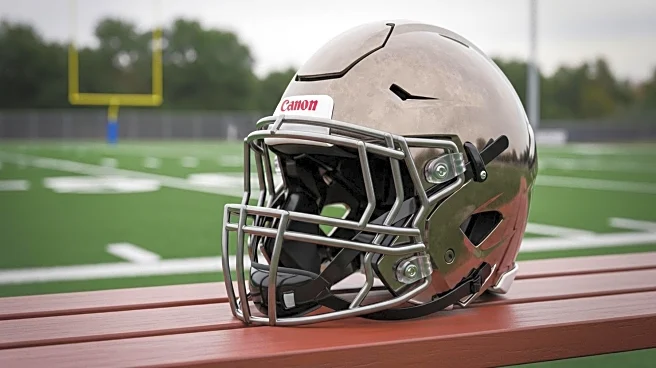What is the story about?
What's Happening?
Kilian O’Connor has been named the starting center for USC's football team, marking a significant achievement for the former walk-on player. O’Connor, who joined USC in 2022, has worked his way up from the depth chart to secure a starting position. His appointment comes after a competitive preseason camp where he outperformed transfer center J’Onre Reed. USC's offensive line faces challenges this season, with O’Connor leading a unit that includes Elijah Paige, Tobias Raymond, Alani Noa, and Justin Tauanuu. The team has had to adjust following the loss of DJ Wingfield, who was denied eligibility by the NCAA. Head coach Lincoln Riley emphasizes the importance of fielding the best players, highlighting O’Connor's consistency and dedication.
Why It's Important?
O’Connor's rise from walk-on to starting center is a testament to perseverance and hard work, inspiring other athletes facing similar challenges. His appointment is crucial for USC as they navigate a season with an unproven offensive line. The team's ability to adapt and find reliable players is essential for their success in upcoming games. O’Connor's leadership and experience, despite limited starts, will be pivotal in stabilizing the offensive line and ensuring effective gameplay. His story underscores the value of determination and the potential for walk-on players to make significant contributions to collegiate sports.
What's Next?
USC's offensive line will continue to evolve as the season progresses, with O’Connor playing a central role in its development. The team will face tests of their cohesion and effectiveness, particularly in high-stakes games. O’Connor's performance will be closely watched, as his leadership could influence the team's overall success. USC's coaching staff may make further adjustments to optimize the lineup, ensuring the best combination of players is on the field. The team's ability to overcome challenges and adapt will be critical in their pursuit of victories.
Beyond the Headlines
O’Connor's journey highlights broader themes of resilience and opportunity in sports. His success as a walk-on challenges traditional perceptions of athletic recruitment and underscores the potential for overlooked players to excel. The story also reflects the importance of adaptability in sports management, as teams must navigate eligibility issues and roster changes. O’Connor's experience may inspire discussions on the value of walk-on programs and their role in fostering talent. His story serves as a reminder of the impact of dedication and the possibilities for athletes who persist despite obstacles.

















